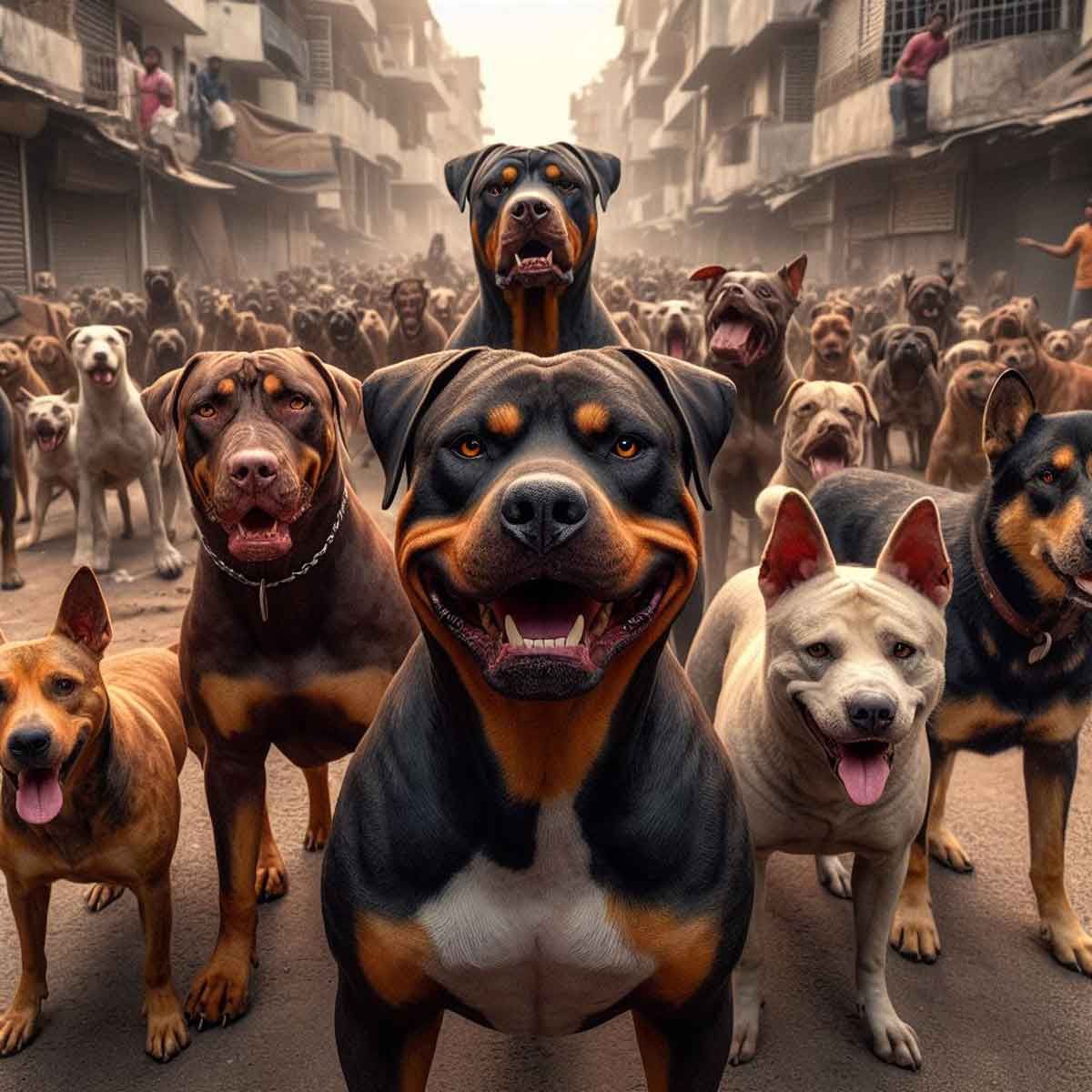More Coverage
Twitter Coverage
Satyaagrah
Written on
Satyaagrah
Written on
Satyaagrah
Written on
Satyaagrah
Written on
Satyaagrah
Written on
JOIN SATYAAGRAH SOCIAL MEDIA
Govt imposes ban on 23 aggressive dog breeds such as Pitbulls, Rottweilers, Mastiffs, Doberman, and German Shepherds to curb attacks and protect citizens, PETA supports the initiative, aiming to prevent dog attacks and promote responsible pet ownership

In an important decision aimed at ensuring public safety, the government has announced a comprehensive ban on the importation, breeding, and selling of certain dog breeds identified as particularly aggressive. This significant move impacts breeds such as the Rottweiler, Pitbull, Terrier, Wolf dogs, and Mastiffs. The directive follows a thorough examination and subsequent recommendations by a panel of experts and animal welfare organizations. This group was convened in response to specific instructions from the Delhi High Court, reflecting growing concerns over the safety risks these animals can pose.
|
The central government's initiative targets a series of dog breeds considered to pose a considerable risk to humans due to their aggressive nature. Among the breeds now facing a ban are the Rottweiler, Pitbull, Terrier, Wolf dogs, and Mastiffs, including any mixed or crossbreeds that share their lineage. The determination of these breeds as hazardous to human safety is the culmination of a detailed analysis and reporting by a dedicated committee. This committee, comprised of expert advisers and representatives from animal welfare groups, was formed to address this issue following a mandate from the Delhi High Court. Their findings have now prompted a decisive response aimed at curbing the potential threat these animals represent.
Further to the prohibition on importing, breeding, and commercial distribution, the government's directive extends to the ownership of existing animals within these categories. The Department of Animal Husbandry and Dairying has taken a proactive role, issuing communications to all state authorities with a clear request: local administrative bodies should not grant any new licenses or permits for the sale or breeding of the specified dog breeds. Additionally, there is a strong push for the sterilization of these dogs if they are currently kept as pets. This measure is seen as a vital step in preventing any increase in their population, thereby reducing the risk of incidents involving these animals.
This broad-ranging and decisive action by the government underscores a commitment to public safety and animal welfare. By targeting specific breeds known for their aggressive behavior, the authorities aim to mitigate the risk of dangerous incidents, including attacks that have, in some instances, resulted in fatalities. The collaboration between the government, expert panels, and animal welfare organizations in formulating this policy highlights a multifaceted approach to addressing a complex challenge. With the implementation of these measures, there is an expectation of a significant reduction in the risks associated with owning and encountering these dog breeds, contributing to safer communities across the country.
Detailed Insights on the Banned Dog Breeds
In light of the government's recent decision to ban the import, breeding, and sale of certain aggressive dog breeds, including their mixed and crossbreeds, here is a closer look at each of the identified breeds and their characteristics that have led to their inclusion in this list:
Pitbull Terrier: Known for their strength and courage, Pitbull Terriers have a reputation for unpredictability and have been involved in various incidents. Their muscular build and powerful bite can be dangerous if not properly trained and socialized.
Tosa Inu: Originating from Japan, Tosa Inus are large and naturally aggressive, bred originally for dog fighting. They possess a quiet demeanor but can become formidable opponents due to their size and strength.
American Staffordshire Terrier: Similar to Pitbulls, these dogs are strong and muscular, often misunderstood for their aggressive tendencies. With proper training, they can be loyal pets, but their strength poses risks.
Fila Brasileiro: Also known as the Brazilian Mastiff, this breed is known for its superb tracking ability but is also highly protective and aggressive towards strangers, making them a liability in public spaces.
Dogo Argentino: Bred for big-game hunting, including wild boar, Dogo Argentinos are powerful and athletic. Their hunting instinct can translate into aggression if not carefully managed.
American Bulldog: Originally used in the blood sport of bull baiting, these dogs are robust and energetic. Their strength and aggression can be challenging to control for inexperienced owners.
Boerboel: Hailing from South Africa, Boerboels are known for their guarding abilities. They are dominant and confident, requiring strict training to manage their protective instincts.
Kangal: This breed from Turkey is famed for its protection of livestock against large predators. Kangals are powerful and have a strong protective instinct, which can lead to aggression if not properly socialized.
Central Asian Shepherd Dog: Bred for guarding livestock, these dogs are independent and strong-willed. Their natural protective instinct can manifest as aggression in unfamiliar situations.
Caucasian Shepherd Dog: Known for guarding properties and livestock, they are extremely protective and can be aggressive towards strangers, necessitating experienced handling.
South Russian Shepherd Dog: These dogs are vigilant and protective, bred for herding and guarding. Their independent nature requires consistent training to curb aggressive tendencies.
Tornjak, Sarplaninac: Originating from the Balkans, these breeds are known for their protective nature, often used to guard livestock. They are loyal but can be wary of strangers, leading to potential aggression.
Japanese Tosa and Akita: Both breeds have a storied history in Japan, with Tosas being bred for fighting and Akitas as hunting dogs. They are known for their loyalty but can be aggressive without proper socialization.
Mastiffs: A diverse group known for their size and strength. While generally gentle with families, their protective nature can lead to aggressive reactions if they perceive a threat.
Rottweiler: Powerful and protective, Rottweilers can be loving family members but also possess strong guarding instincts, making them potentially aggressive towards strangers.
Terriers: This broad category includes breeds that are energetic and tenacious. Some terrier breeds can exhibit aggressive behaviors, especially without sufficient exercise and mental stimulation.
Rhodesian Ridgeback: Originally bred for hunting lions, they are independent and strong-willed. Their protective instinct can lead to aggression if not properly managed.
Wolf Dogs: Hybrids between dogs and wolves, they retain much of their wild ancestry's traits, including unpredictable behaviors and potential for aggression.
Canario: Known for their strong guarding instincts, Canarios can be wary of strangers and aggressive if not properly trained.
Akbash: Originating from Turkey, Akbash dogs are calm but vigilant guardians. Their protective nature requires careful socialization to prevent aggressive behaviors.
Moscow Guard: Developed for guarding, these dogs are large and possess a natural protective instinct, which can lead to aggressive responses in unfamiliar situations.
Cane Corso: An Italian breed known for guarding and protection, Cane Corsos are powerful and require strict training to manage their dominant personalities.
Bandog: A term originally used to describe any robust, powerful dog bred for guarding, Bandogs are known for their strength and protective instincts, which can manifest as aggression without proper training.
These breeds, identified for their aggressive tendencies, require experienced handling, proper socialization, and training to ensure they do not pose a risk to public safety.
In a comprehensive response to growing concerns from the public and animal welfare organizations, the government has outlined its stance through an official letter that addresses the significant issue of owning aggressive dog breeds as pets. This move is in direct alignment with the Delhi High Court's directive, which called for a decisive action regarding the ban of certain dog breeds. The court emphasized the importance of consulting all relevant stakeholders in this matter, setting a preferred timeframe of three months for the Union of India to make an informed decision. This approach underscores the government's commitment to a balanced and well-considered policy decision, taking into account the varied perspectives of those affected and the overall safety of the community.
Furthermore, the government has reiterated the necessity for strict adherence to established animal welfare regulations, specifically pointing to the Prevention of Cruelty to Animal (Dog Breeding and Marketing) Rules 2017 and the Prevention of Cruelty to Animal (Pet Shop) Rules 2018. These guidelines are crucial for maintaining a humane and regulated environment for the breeding and sale of pets. The directive urges local authorities and state animal welfare boards to enforce these rules diligently, ensuring that the practices surrounding pet ownership align with the highest standards of animal welfare and ethical treatment.
The overarching goal of the government's decision is to enhance the safety of the public by mitigating the risks associated with aggressive dog breeds, while also promoting a culture of responsible pet ownership. By implementing this ban, the authorities aim to prevent future incidents of dog attacks, which have raised significant concerns in recent times. This policy is not just about restricting certain dog breeds but is also a proactive measure to ensure the welfare of animals by encouraging practices that are in their best interest and the interest of the communities they are part of.
To facilitate the smooth implementation of this ban, local governing bodies are tasked with issuing detailed guidelines that will govern the sale, breeding, and ownership of the specified dog breeds. These guidelines are expected to provide clear instructions for pet shops, breeders, and current pet owners on how to comply with the new regulations, thereby ensuring that the transition is managed effectively and with consideration for all parties involved. This step is indicative of the government's thoughtful approach to policy implementation, emphasizing a harmonious balance between public safety and the rights and welfare of animals.
|
|
Government Responds to PETA's Appeal: A Move to Safeguard Both Dogs and Humans
The government's recent action to ban the import, breeding, and sale of certain aggressive dog breeds marks a significant response to the concerns raised by People for the Ethical Treatment of Animals (PETA) India. PETA's advocacy aimed to protect not only the vulnerable dog breeds often exploited by criminal elements for illegal dog fighting but also to ensure the safety and well-being of humans. The organization took a formal step by filing a writ petition in the Delhi High Court, emphasizing the urgent need for this issue to be addressed.
PETA's petition to the court highlighted the distressing reality faced by specific dog breeds, particularly Pit Bulls and related breeds, which are not only bred for aggressive purposes but also represent the majority of abandoned dogs across India. The statement made in the petition, "This order is key toward providing vital protection for both humans and dogs and sends a strong, clear message that pit bulls and other such breeds are bred to be used as weapons. Pit bulls and related breeds are the most commonly abandoned dogs in India, and this action can prevent a great deal of suffering," underscores the dual benefit of the proposed ban: safeguarding human life and alleviating the suffering of countless dogs.
The urgency of implementing such measures has been further underscored by recent tragic incidents involving dog attacks. Reports have emerged from various parts of the country detailing severe injuries and even fatalities resulting from these encounters. Notably, a distressing incident in Himachal's Bilaspur area saw 20 people injured after an attack by a stray dog. Similarly, harrowing experiences were recorded in Delhi, where a toddler endured a 17-day hospital stay following a Pitbull attack, and in Ghaziabad, where a 10-year-old child was critically injured in another attack by the same breed.
In its decisive order dated December 6, 2023, the Delhi High Court mandated, "That after consulting all stakeholders, the Union of India shall decide petitioner's representation as expeditiously possible, preferably, within three months". This directive not only emphasized the need for a swift resolution to the concerns raised by PETA but also reinforced the government's responsibility to ensure the effective implementation of the Prevention of Cruelty to Animals Rules 2017 (regarding dog breeding and marketing) and Prevention of Cruelty to Animals Rules 2018 (Pet Shop). These regulations are crucial for establishing a framework that supports the ethical treatment of animals while safeguarding public safety.
The government's initiative, prompted by PETA's appeal and the subsequent judicial directive, signifies a comprehensive approach to addressing the dual concerns of animal welfare and public safety. By urging states to rigorously enforce animal welfare regulations, the government aims to create a safer environment for both people and animals. This commitment to implementing effective policies reflects an acknowledgment of the complex relationship between humans and dogs, striving to protect the interests and well-being of both.
 |
 Support Us
Support Us
Satyagraha was born from the heart of our land, with an undying aim to unveil the true essence of Bharat. It seeks to illuminate the hidden tales of our valiant freedom fighters and the rich chronicles that haven't yet sung their complete melody in the mainstream.
While platforms like NDTV and 'The Wire' effortlessly garner funds under the banner of safeguarding democracy, we at Satyagraha walk a different path. Our strength and resonance come from you. In this journey to weave a stronger Bharat, every little contribution amplifies our voice. Let's come together, contribute as you can, and champion the true spirit of our nation.
 |  |  |
| ICICI Bank of Satyaagrah | Razorpay Bank of Satyaagrah | PayPal Bank of Satyaagrah - For International Payments |
If all above doesn't work, then try the LINK below:
Please share the article on other platforms
DISCLAIMER: The author is solely responsible for the views expressed in this article. The author carries the responsibility for citing and/or licensing of images utilized within the text. The website also frequently uses non-commercial images for representational purposes only in line with the article. We are not responsible for the authenticity of such images. If some images have a copyright issue, we request the person/entity to contact us at This email address is being protected from spambots. You need JavaScript enabled to view it. and we will take the necessary actions to resolve the issue.
Related Articles
- "Bone China: The Untold Truth in a Name": Did you know Bone China is made from cow & ox bones? For Sanatan Dharma followers, it contradicts Ahimsa's core values, explore the surprising truth behind this popular crockery and its clash with ancient beliefs
- "Animal protector or anti-Hindu organization": After seeking ban on Temple elephants, Jallikattu and Kambala buffalo race, PETA goes after Kili Josiyars - Fortune-Tellers Using Parakeets, 7 Arrested By Tamil Nadu Forest Department
- PETA India’s latest wisdom – Cows are killed for beef because you are drinking milk and eating cheese
- Jagannath Temple administration issues clarification on proposed sale of temple lands
- NCPCR Asks Delhi Police To File FIR Against Twitter; Seeks Ban For Kids Until Deemed Safe
- Farmers gathered outside the residence of CM Ashok Gehlot and protested as banks are auctioning the agricultural land of farmers on failure to repay loans despite Rahul Gandhi’s tall promises: ‘Congress has ruined our lives'
- To protest against street Namaz, politicians and Mayor of a suburb sang the national anthem: France
- Once again lampooning Hindu religious sentiments, TN HRCE approved a project to build a fish market on temple land using temple money
- Indian Ambassador TS Tirumurti raised the issue of 'Hindumisia' at the UN forum during the International Counter-Terrorism Conference 2022; raised awareness about Hinduphobia that is rising across the world
- Is Maha Vikas Aghadi alliance in Maharashtra on the verge of an imminent collapse?
- India successfully carried out the test firing of a new missile of the Agni series known as Agni-Prime
- Twitter rewards an Islamist org, set to be banned by India, with a verified blue tick: Here is what PFI has done in the past
- Dharm / Sanskriti
- From joining ‘farmers’ protest to converting Rohingyas for Indian citizenship: How Christian groups have exploited the pandemic
- Old clip where SRK said he’d be okay with his son doing drugs makes round after Aryan Khan detained in drugs party case




























